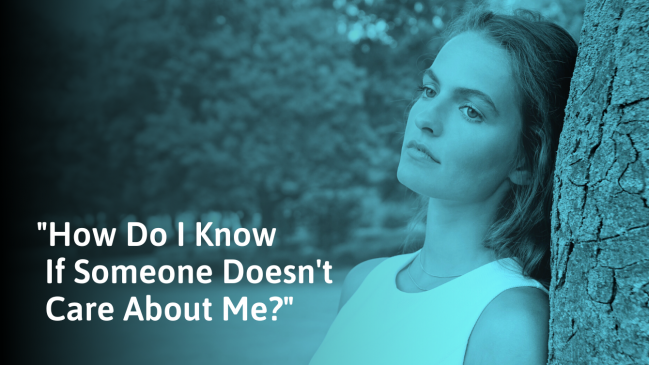The difference between healthy and toxic friendships is that in healthy friendships, unspoken expectations are met.[1] There is equal give and take, as well as mutual support and mutual investment.[1]
Toxic friendships, however, are marked by an overall lack of caring. Toxic friends will hurt your feelings and show no acknowledgment of their wrong actions. If you dread the thought of spending time in a certain friend’s presence, that’s an indication to examine the friendship more closely.
In this article, you will be taught what signs to look for to spot a toxic friend who doesn’t truly care about you. You’ll also learn why some friendships are toxic and how you can deal with a friend that doesn’t care about you.
Sections
- 12 signs that your friend doesn’t care about you
- Why some friendships are toxic
- How to deal with a toxic friendship
12 signs that your friend doesn’t care about you
1. They don’t communicate
In toxic friendships, communication often feels one-sided. Reciprocity is a crucial component of healthy friendships.[2] But putting in the effort isn’t important to the uncommitted friend. Fair-weather friends only communicate when it suits them, and it’s usually to satisfy their own needs.
If you notice these communication patterns from a friend, your friendship may be toxic:
- You are always the one reaching out first.
- They only contact you to ask for favors or when they need something.
- They avoid your texts and calls but resurface when they need something.

2. They exclude you
A friend that cares about you will make you a priority in their life. They will want to spend time with you and will make an effort to include you in their social calendar. But when it comes to toxic friends, you will be a friend of convenience—you will feel like the backup friend in that person’s life.
Here are some examples of what it looks like to be excluded by a toxic friend:
- They invite you out at the last minute if their other plans fall through.
- They make plans with other friends but “forget” to invite you along.
- They don’t invite you to special occasions, like birthdays.
- They will make flexible plans with you and cancel when something better comes up.
3. They disappear at the first sign of trouble
One of the greatest benefits of a good friendship is that it helps reduce stress.[3] That’s because good friends offer support in times of hardship.[3]
An easy way to tell the difference between a true and a fake friend is to ask yourself how your friend responds when you’re having a tough time. If they are “too busy” to talk, make up an excuse for why they can’t help you, or flat-out ignore you, then they’re probably not the best friend. Friends who care about you care about your wellbeing and will willingly offer to support you.
4. They can never be happy for you
Toxic friends are insecure deep down, which makes it difficult for them to be happy for anyone else.[4] With a toxic friend, you’ll get the sense that they resent your successes. A toxic friend will express their bitterness by either downplaying your achievements or trying to compete with them.
Here are two examples:
- Belittling looks like, “You’re so lucky to have had your dad invest in your company. Imagine where you’d be without him.”
- Competing looks like, “I thought your company would have grown more by now. Our company had already grown by 15% in our third month.”
5. They use you
In toxic friendships, interactions with your friend will feel like one-way transactions where you are always giving but never receiving. These types of interactions will leave you feeling unsettled and used.
Here are some examples:
- When they contact you, it’s always to ask for something: money, a ride into town, or help with their chores. When you need something, they never reciprocate.
- They talk about their problems at length and never give you a chance to speak up.
- They try to get gossip out of you that they can use against you or against others in the future.
6. They don’t respond to your feelings
It hurts when you open up to a friend and they either dismiss your feelings or change the subject. When a friend acts like this, it suggests that they are emotionally unavailable or that they simply don’t care about you.
People who are emotionally unavailable often lack empathy and self-awareness.[5] They find it hard to relate to others’ emotions. If your friend lacks insight into their behavior, then bringing it to their attention might help them recognize what they are doing wrong. But if they truly don’t care, there will be no apology and no change.

7. They don’t know the real you
In healthy friendships, when both friends share personal information with one another, it brings them closer together.[6] One of the greatest benefits of a good friendship is feeling able to share freely and to have someone you know will listen to and understand you.
In a toxic friendship, your friend won’t care to get to know you on a more intimate level. The strange thing is that they will happily share a lot of personal information about themselves. But when you share something back, they won’t probe for more details. Instead, they will appear totally disinterested.
8. They talk about you behind your back
A friend who does not care about you will have no problem breaking your trust and sharing your secrets with others. They will also have no problem dragging your name through the mud. If others bad-mouth you, they will join in instead of sticking up for you.
A true friend, on the other hand, would value your trust and would never share anything you told them in confidence with others. They are fiercely defensive, and they would intervene if they heard others speaking poorly of you.
9. They can never apologize
Friends that care about you will want to resolve any conflict that comes about as quickly and as peacefully as possible. But with toxic friends, conflict creates drama. That’s because toxic friends have difficulty admitting when they are wrong and apologizing.
If you try to talk to a toxic friend about how they have hurt you, they may try to minimize your pain or lash out in anger. They may become defensive and try to turn the situation around. For example, say you told your friend you were upset because they had canceled on you three times in a row. They might tell you that you’re too clingy or demanding. Instead of apologizing, addressing the issue, and coming to a compromise, they will flip the blame on you.
8. They put you down
Toxic friends often have low self-esteem, which they may try to manage by putting others down.[7] The purpose of this behavior is to try and make themselves appear superior and to boost their self-worth.[7]
Here’s an example of how a toxic friend might put you down in front of other people:
- Let’s say someone complimented you on your hair, saying, “Wow, I love your hairstyle. It looks great!” A toxic friend, upon hearing this, might comment something like, “It only took her like 3 hours, so I should hope so!”
9. They never hear you out
To a friend who doesn’t care about you, listening to anything you have to say is burdensome. Toxic friends will always seem distracted or disinterested when you’re speaking. They might just scroll through their phone or stare straight through you into the distance.

Whenever they can, they’ll interrupt you or speak over you. You’ll notice that they’re always trying to bring the conversation back to them.
10. They encourage you to make poor decisions
Friends who don’t care about you won’t give you sound advice when it comes to making impactful decisions. In fact, if it suits them, they will even encourage you to make the wrong decisions.
Imagine you go out with a friend, and you have more to drink than planned. Now, let’s say that your friend was relying on you for a lift home. You tell your friend that you want to leave your car behind and Uber back home as you don’t want to get a DUI. A good friend would understand and would be fine with that. A toxic friend, on the other hand, might try to convince you to just drive and insist that nothing bad will happen.
11. They cross your boundaries
A toxic friend will not respect your boundaries—they will try to push your limits if it means they can get their needs met.
For example, say that you explained to a friend that you couldn’t go out this weekend as you really need to study for an exam. A toxic friend won’t care that you have set this boundary and that it is important to you. If they have nobody else to go out with, they will push your boundaries. They will try to guilt-trip you into breaking your boundaries if it means they have someone to go out with.
12. They evoke negative feelings
If the idea of hanging out with a certain friend brings about feelings of dread, then that’s a strong sign you’re dealing with a toxic friendship. Interactions with toxic friends are mostly negative. They usually involve the other person offloading on you or putting you or others down. This is emotionally taxing. You will often leave a toxic friend’s presence feeling drained.
Why some friendships are toxic
When you realize you’re dealing with a toxic friend, it’s hard not to be angry and upset about the way your friend has been treating you. You may be wondering how it’s even possible that someone who is supposed to be a friend could be so uncaring. The truth is, it may not entirely be your friend’s fault that they suck at friendship.
Below are three reasons why your friend may be displaying toxic traits:
1. Your friend may have an insecure attachment style
People first learn how to relate to one another through relationships with their primary caregivers—usually their parents.[8]
If parents are in tune with their children’s emotions and respond to them in a positive way, then children grow up with a secure attachment style as adults. They have mostly healthy relationships with few issues.[8] If children’s needs are met inconsistently, though, they can develop an insecure attachment style in adulthood. People with this attachment style don’t have the best understanding of their own and others’ emotions, and this results in the kinds of issues you see in toxic friendships.
2. Your friend may have low self-esteem
Traits such as arrogance and pride can be mistaken for high self-esteem, but these are actually toxic traits that indicate low self-esteem.[9]
The difference between people with high and low self-esteem is that people with high self-esteem hold others in high regard.[9] They do not feel the need to appear better than others. People with low self-esteem, on the other hand, are very insecure. They will often use tactics like putting others down if it makes them come across as superior or even just to feel better about themselves.[9]
3. Your friend may be depressed
Depression can affect friendships because people who are depressed tend to withdraw socially.[10] So, if your friend has suddenly stopped talking to you as much or is always making excuses for why they can’t hang out, there may be something larger at play.
People with depression tend to withdraw from others because they feel like a burden and because they usually don’t have a lot of energy.[10] Socializing—even with their best friends—can feel like a chore to a person who is depressed. Depression can also cause people to become irritable, so if your friend has suddenly developed a short temper, they may be feeling overwhelmed.[11]
This article on how to talk to someone with depression might be helpful.
4. Your friend might have a personality disorder
Sometimes a personality disorder can be at the root of behaviors seen in toxic friendships. However, this is in exceptional cases—only 9% of the US population have some type of personality disorder.[12]
Personality disorders make it difficult for people to function in relationships for a variety of different reasons. People with narcissistic personality disorder—as an example—are very self-focused and lack empathy. This translates to them having zero to very little regard for others’ needs which makes it hard for them to connect with others in a meaningful way.[13][14]
How to deal with a toxic friendship
If you’ve spotted the signs that your friendship is toxic, what do you do next? Do you approach them and try to work through things, or do you let it go and walk away?
That is a question only you can answer, and it depends on how valuable this friendship is to you. Perhaps things weren’t always this way with your friend: you never believed they would act like this, and you’d like to give them the chance to explain their behavior.
Here are some tips for how to deal with a toxic friend, whether you want to give them another shot or walk away:
1. Confront them
If you want to resolve the issues in your friendship, you’ll need to confront your friend about their behavior.
Here’s what to do:
- Ask them if you can talk and let them know what the conversation will be about, so they don’t feel put on the spot.
- When you talk to them, back up your claims about their behavior with examples.
- Use I-statements so that they don’t feel attacked. For example: “When you canceled on me three times in a row, I felt let down and unimportant.”
- Allow them space to give you an explanation (and hopefully an apology!).
- Tell them how you’d like to be treated instead.
2. End the friendship
If you have tried to confront your friend, but it didn’t go as planned, or if you’re not prepared to put in the effort to save the friendship, you can end it.
There are several ways to bring your friendship to a close. We’ve outlined a few strategies you can use in an article that explains how to end a friendship. These include slowly withdrawing from your friend, writing them a letter, or simply cutting them off.
Alternatively, you can take a more direct approach. Here’s how:
- Set a time to talk through your decision with them in person.
- Write down everything you want to say and think about how you will stick to your decision if they try to sway you.
- Meet them in public so that you can easily remove yourself from the situation if it escalates.
- Explain how you came to your decision and why you think it is best for you right now.
- Let them know that you will be blocking them from all forms of contact.
3. Check your mental health
When people treat you poorly, it can damage your self-esteem and overall mental health. It’s important to check in with how you’re feeling and how you’re coping. If you’re feeling overwhelmed and finding it difficult to move on, then seeking professional support from a therapist might help you put things into perspective.








